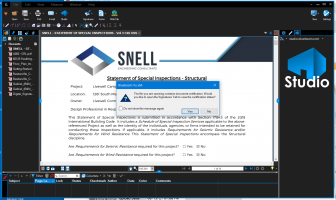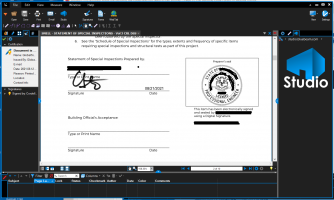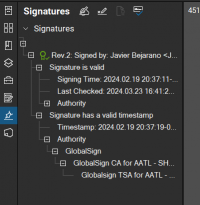-
Welcome to The Building Code Forum
Your premier resource for building code knowledge.
This forum remains free to the public thanks to the generous support of our Sawhorse Members and Corporate Sponsors. Their contributions help keep this community thriving and accessible.
Want enhanced access to expert discussions and exclusive features? Learn more about the benefits here.
Ready to upgrade? Log in and upgrade now.
You are using an out of date browser. It may not display this or other websites correctly.
You should upgrade or use an alternative browser.
You should upgrade or use an alternative browser.
Shouldn't my architect know the building use codes and not need to call zoning?
- Thread starter jlfitz67
- Start date
Yankee Chronicler
REGISTERED
This statement on a PDF is useless unless the digital signature can be verified. I see too many plans examiners see this on the PDF and think they are good to go. They are absolutely not good to go.
View attachment 13172
Absolutely correct. When you see this on a paper print there is no way to verify it. When viewing the document as a PDF, most PDF viewers provide a way to verify digital signatures. See my post above for Adobe Reader.
For Bluebeam: https://support.bluebeam.com/blog/digital-signatures/
Even the old (now discontinued) Bluebeam Vu PDF reader has the capability to verify digital signatures. When I open a digitally-signed PDF in Bluebeam Vu, I am asked if I want to verify the digital signature:

When I click "Yes," I see the following:

Hovering over any item in the pop-up panel displays the full contents of that field.
Closing the Certification panel and opening the Signature panel immediately beneath it allows inspection of the specific digital signature.
jar546
CBO
I second that.Obviously the Owner and the architect are incompatable.
walker.t
SAWHORSE
Yes, engineers' report and letters are subject to the same requirements.
Thank you for your two responses. Interesting that the certification can expire after so much time. Now that I think about it I might expect more design professionals to add a note regarding how long their drawings are valid for permitting, I’ve seen only one set of drawings (from a structural engineer) that had such a note.The short answer is that we don't accept documents that have (allegedly) been wet stamped and then scanned. Once it has been scanned, we have no way of knowing if the entire page was scanned, or if the seal and signature were scanned and then imported into the document.
Yankee Chronicler
REGISTERED
NYC Architect74
REGISTERED
Hi There,I have a estimate from the architect for a drawing and he like... doesn't know the codes. I am putting a pottery studio in a retail space and will have a mix of classes and retail.
I have done all the homework on this myself, met with building officials, fire marshals, had an engineer do a site plan review and now I just need a drawing for the submission of the plan to move a sink and install a kiln. From EVERYTHING I have researched (and asked on here) it is not a change of use, it is classified currently as "B" Business and the architect wants to charge me for the time it takes him to figure this out with calls to zoning?
I just need a stamped drawing and the quote is now over 2000.00 with the ONLY change in the space being moving the sink and install of the kiln.
no walls, no cabinets installed no nothing. I also gave them the previous file with 89 pages of documents, the original drawings etc.. they have all the measurements, I even gave them the measurements of the furniture which the building official said he doesn't need. just wants to see where in the space which activity happens.
I am very sorry for all the nasty replies on here. I happen to be an architect AND a potter. Please come away with your experience on this forum knowing that you were dealing with "the internet" and not necessarily "architects".
I can see the issue is that you have hired an architect to do a simple drawing for your submission, when that is not the primary service an architect should be providing. The problem is that once an architect becomes involved, they really do need to do a lot of research to ensure that nothing they do risks their license. Obtaining an architectural license requires over 6 years of schooling, over three years of apprenticeship, and hundreds of hours of exams. Architects do provide great value and great service, but their best value is not found in drawing up plans for a sink move. This sounds like more of a job for an engineer, or even licensed plumbers and electricians who you can hire through your contractor.
Partnering with an architect would be worthwhile if you were renovating the entire space, changing the layout, trying to drawing in new business, selecting finishes, and coordinating heavily between all the different construction trades without things going wrong. In that case the $2,000 of work to do code research would be included, and a drop in the bucket, and you'd end up with a gorgeous studio that everyone loved and happened to also be legal and met all codes.
Good luck with your new studio!
Yikes
SAWHORSE
Well said, NYC Architect74.Hi There,
I am very sorry for all the nasty replies on here. I happen to be an architect AND a potter. Please come away with your experience on this forum knowing that you were dealing with "the internet" and not necessarily "architects".
I can see the issue is that you have hired an architect to do a simple drawing for your submission, when that is not the primary service an architect should be providing. The problem is that once an architect becomes involved, they really do need to do a lot of research to ensure that nothing they do risks their license. Obtaining an architectural license requires over 6 years of schooling, over three years of apprenticeship, and hundreds of hours of exams. Architects do provide great value and great service, but their best value is not found in drawing up plans for a sink move. This sounds like more of a job for an engineer, or even licensed plumbers and electricians who you can hire through your contractor.
Partnering with an architect would be worthwhile if you were renovating the entire space, changing the layout, trying to drawing in new business, selecting finishes, and coordinating heavily between all the different construction trades without things going wrong. In that case the $2,000 of work to do code research would be included, and a drop in the bucket, and you'd end up with a gorgeous studio that everyone loved and happened to also be legal and met all codes.
Good luck with your new studio!
Unfortunately, I think the OP's post #6, where they said they didn't need signed drawings though they already said they needed stamped drawings, coupled with their (IMO somewhat defensive) response "I'm not stupid", that accelerated the thread on a downward spiral for the OP. It is possible to be at the same time both very intelligent yet also ignorant of the specific facts of a given situation.
There's no shame in being ignorant, as long as you are open to the possibility of learning more - - after all, pretty much every project starts with "what do I need to know to move forward?".

